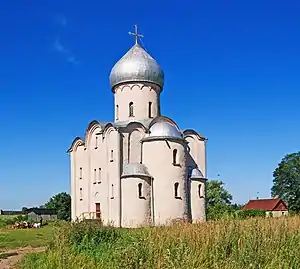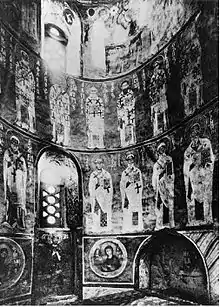Nereditsa Church
The Saviour Church on Nereditsa Hill near Novgorod (Russian: церковь Спаса на Нередице, Tserkov Spasa na Nereditse) is a 12th-century Orthodox church dedicated to the feast of the Saviour's Transfiguration.

The church, consecrated in 1198, became world-famous both for its remarkable state of exterior preservation and for the best preserved set of pre-Mongol wall paintings in the Russian Empire. During the World War II it was selected as a target for artillery fire and was reduced to rubble.
The post-war reconstruction of the Nereditsa Church is on the World Heritage list as a part of object 604 Historic Monuments of Novgorod and Surroundings.[1][2] The building has been designated an architectural monument of federal significance (#5310113002).[3]
It is located in Novgorodsky District of Novgorod Oblast, Russia, 1.5 kilometres (0.93 mi) south of Veliky Novgorod in the village of Spas-Nereditsy on the right bank of the Maly Volkhovets River on a small Nereditsa Hill next to the Rurik hillfort.
History
The church was built in 1198 by Prince Yaroslav Vsevolodovich[4] and painted with frescoes in 1199.[5] The church was located outside the city of Novgorod but close to the residence of the prince. It was probably regarded by the prince as the place for his future tomb.[4] In 1903-1904 it was measured and restored by Pyotr Pokryshkin.
During World War II the church was located on the front line between 1941 and 1943 and was destroyed. It was subsequently restored, however, most of the frescoes could not be saved, and are currently known because the pre-war photos exist.[6]
Architecture

The small stone church is built as a cube and has one dome. It is based on four pillars and has three apses at the eastern side.[7] The type of a small church was developed in Novgorod in the end of the 12th century, and there are several churches of this type, in Novgorod and in Staraya Ladoga.[8]
Frescoes
The frescoes were created by eight to ten artists. They covered all the interior of the church, including the pillars, the walls, the ceiling, and the dome. There is no apparent system in creating the frescoes. It's possible that the painters did not know each other and had different styles. In particular, normally a fresco of Christ the Saviour should be painted in the dome. However, for the Saviour Church on Nereditsa, the dome was occupied by the Ascencion. Christ was painted in the dome in Byzantine Empire already in the 9th century, and painting other frescoes in the dome was at the time the sign that the church belongs to a highly peripheral region. The most impressive fresco in the church was considered to be the Last Judgment, painted over the whole western wall. Only fragments of this fresco survived. In 1246, a portrait of Prince Yaroslav Vsevolodovich was added to the southern wall.[5]
References
- "Archived copy" Архитектура и настенная живопись новгородской церкви Спасо-Преображения на Нередице (in Russian). Мультимедийная информационная система «Архитектура и настенная живопись новгородской церкви Спасо-Преображения на Нередице». Archived from the original on 15 April 2018. Retrieved 20 March 2012.CS1 maint: archived copy as title (link)
- "Archived copy" Перечень памятников истории и культуры г. Великий Новгород и его окрестностей, имеющих выдающуюся универсальную ценность, включенных в 1992 году Решением юбилейного заседания Комитета Всемирного наследия ЮНЕСКО в Список Всемирного наследия (in Russian). Комитет культуры Новгородской области. Archived from the original on 2 May 2012. Retrieved 16 April 2012.CS1 maint: archived copy as title (link)
- "Archived copy" Церковь Спаса на Нередице (in Russian). Ministry of Culture of Russian Federation. Archived from the original on 26 April 2014. Retrieved 15 March 2011.CS1 maint: archived copy as title (link)
- "Заказчик храма князь Ярослав Владимирович". Архитектура и настенная живопись новгородской церкви Спасо-Преображения на Нередице. Archived from the original on 15 April 2018. Retrieved 20 March 2012.
- Пелевин, Ю.А. (2012). Фрески Спаса на Нередице церкви близ Новгорода. 1199 (in Russian). Российский общеобразовательный портал. Archived from the original on 20 February 2009. Retrieved 17 March 2012.
- Зотова, Елизавета. Фрески Спаса на Нередице (in Russian). "Первое сентября". Archived from the original on 16 April 2013. Retrieved 16 March 2012.
- "Archived copy" Архитектура Нередицы (in Russian). Мультимедийная информационная система «Архитектура и настенная живопись новгородской церкви Спасо-Преображения на Нередице». Archived from the original on 15 April 2018. Retrieved 21 March 2012.CS1 maint: archived copy as title (link)
- "Archived copy" Архитектура Новгорода (in Russian). Мультимедийная информационная система «Архитектура и настенная живопись новгородской церкви Спасо-Преображения на Нередице». Archived from the original on 12 April 2018. Retrieved 20 March 2012.CS1 maint: archived copy as title (link)

.jpeg.webp)